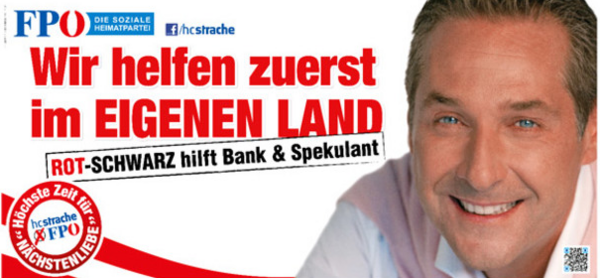
National Council election 2013
The National Council election of 29 September 2013 was the third occasion on which Heinz-Christian Strache led the FPÖ into the election as its lead candidate. The Freedom Party achieved 20.51 percent of the vote, which comprised an increase of 2.97 percentage points. That translated into 40 National Council seats, 6 more than at the previous general election.
As had already been the case in the two preceding National Council elections, the SPÖ and ÖVP again suffered losses and as in 2013, the SPÖ of Werner Faymann once more remained in first place. The Greens were able to increase their vote share, the BZÖ did not make it back into the National Council, while two new parties managed to enter: the “Team Stronach” and the NEOS.
Brief description of the election campaign
In the autumn of 2013, at the end of the first-ever five-year legislative period, there were regular elections to the National Council.
With support from the Austro-Canadian billionaire, Franz Stronach, a new electoral list had emerged from the BZÖ: the “Team Stronach”, which also hoped to make headway with Freedom Party topics. Equally new were the NEOS, a party with a rather left-liberal character.
The themes of the Freedom Party election campaign remained the same as in previous elections, since barely anything had changed in the Grand Coalition government.
Central for the FPÖ were the topic of immigration, the question of social security and the fight against Brussels centralisation. Using the slogan “Nächstenliebe” (“Love thy neighbour”), the FPÖ presented itself as “inländerfreundlich” (“friendly to nationals”) and sought to further raise the profile of its leading candidate, "HC" Strache, as an alternative to the two old parties. The slogan “Liebe deine Nächsten - für mich sind das unsere Österreicher” (“Love thy neighbour – for me, they are our Austrians”) and the motto “Höchste Zeit für Nächstenliebe” (“High time to love thy neighbour”) served as red threads for all elements of the campaign.
Election result
The following parties and electoral lists, among others, stood for election at the National Council election of 2013:
Sozialdemokratische Partei Österreichs (SPÖ)
Österreichische Volkspartei (ÖVP)
Freiheitliche Partei Österreichs (FPÖ)
Die Grünen – Die Grüne Alternative (GRÜNE)
Bündnis Zukunft Österreich (BZÖ)
Kommunistische Partei Österreichs (KPÖ)
NEOS – Das Neue Österreich und Liberales Forum (NEOS)
Piratenpartei Österreichs (PIRAT)
Das Team Stronach für Österreich (FRANK)
Parties | Votes | Vote share 2013 | ± | Seats 2013 | ± |
SPÖ | 1,258,605 | 26.82% | -2.44% | 52 | -5 |
ÖVP | 1,125,876 | 23.99% | -1.99% | 47 | -4 |
FPÖ | 962,313 | 20.51% | +2.97% | 40 | +6 |
GRÜNE | 582,657 | 12.42% | +1.99% | 24 | +4 |
TEAM STRONACH | 268,679 | 5.73% | n.a. | 11 | n.a. |
NEOS | 232,946 | 4.96% | n.a. | 9 | n.a. |
Government formation
Despite both former major parties, the SPÖ and ÖVP, recording electoral lows, they once again formed a coalition under the leadership of Werner Faymann. This weakened government was to provide fertile ground for further gains in particular for the FPÖ, the strongest opposition force.
